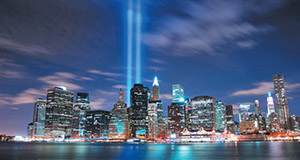
The world recently commemorated 9/11—the day where countless lives were taken, the day when our sense of security was forever shattered, the day that forever lives on in our collective memory. But I use the word “our” very loosely. You see, if you ask me where I was and what I was doing the moment the towers were destroyed… I won’t have an answer for you.
I was born in 1997; that disastrous day, I wasn’t even four years old yet. I don’t remember anything about the day of 9/11 itself. I must’ve been in nursery school—I was attending Temple Beth Shalom, before starting at Yeshivat Noam. My dad worked at a news station in Secaucus, and ended up working massive, 10-12 hour days because of 9/11. (He now works in Manhattan, but at the time he fortunately did not—if he did, he could’ve been trapped in the city.) My mom ended up leaving work an hour after she got there, after hearing about it and seeing the towers fall, to pick my siblings and I up from school, because she was nervous about the highway being closed. For her, she said, it was a sad and terrible week.
All of this I know secondhand; I might remember bits and pieces from my time at TBS, but I can’t remember many specific moments. Certainly I can’t remember specific days.
Nor will many other people in my generation—I can’t speak for everyone, but admittedly my generation is among the first now that won’t remember the tragedy well or at all.
Can we still feel pain and sorrow and the like for that day, if we don’t remember it? The answer might seem obvious: of course. We can still feel emotion for events that happened long before we were born; there are still many tragedies we commemorate that we can feel real emotion for without having been there. We observe Yom HaShoah and Yom Hazikaron, for instance, and are moved by the stories of survivors and warriors and those who didn’t make it out from the wars. (The fact that American days to remember tragedy—such as Memorial Day—are given less attention in both the Jewish and secular worlds is an issue in and of itself, but it’s beyond the scope of this article.)
But the problem is that without having a memory of the events, our emotion may be a bit muted. For me, at the least, it’s hard to fully connect to the past, as much as I try. As much as I want to feel the true pain and entirely connect to the anguish of the day, the fact is that I don’t remember the day of 9/11 itself and only know about what it is from secondhand sources. So can I—can those of us who don’t remember—truly feel for the tragedy? Or is that impossible—is our emotion, our sorrow, going to be incomplete?
I can’t answer right now for other days of tragedy, but in regards to 9/11, I think what’s important to remember is that even now—fourteen years later—we are still feeling the repercussions of that day. Just look at airport security: constant lines and hardcore new measures, pat-downs, full-body scanners… Getting on a plane has never been more difficult, and for very good reason. Just look at the headlines about the “War on Terror” and the conflicts it led to abroad, headlines that took years and years to thin out and dissipate as it became clear it was hard to accomplish much. Just look at the undercurrent of fear now whenever we see security guards and hear about security measures, and subconsciously think, “We need this.” Because you never know what could happen.
The day of 9/11 is still with us in that way. But I also think it’s remained with us in another way—because of the element of hope.
After the tragedies occurred, people worked hard to rebuild, to come together. There are stories of people working together as the towers collapsed behind them, first responders rushing into the smoke to save as many people as they can—overall, people were hoping to save as many as they can and hoped to rebuild the shattered world. Once again, I do not remember any of this. But I see an element of this hope every weekday morning of my commute.
Every morning, my bus passes over the George Washington Bridge. No matter what else you want to say about the world’s arguable most infamous bridge, you have to admit it has a killer view. A whole side of Manhattan is laid out before you, accented by the river.
Further downtown, there’s a newer skyscraper reaching to the heavens—One World Trade Center. As my years at Ramaz have gone on, I’ve watched the building take shape more and more (when I began it was mostly built but still was visibly under construction). Now it is complete, open to the public as a gleaming sign that we can, and have, rebuilt.
So no, I and many people in my generation cannot remember the day of 9/11. But I believe we can commemorate and feel for it fully—because its emotion and repercussions, both of fear and of hope, are still with us.
Oren Oppenheim, 17, is a rising senior at Ramaz Upper School in Manhattan and lives in Fair Lawn, NJ. He spends his free time writing and reading, and hopes to become a published novelist and a journalist. He attended the BIMA Arts program at Brandeis University this past summer, majoring in creative writing and minoring in animation. You can email him at [email protected] and see his photography at facebook.com/orenphotography.
By Oren Oppenheim










